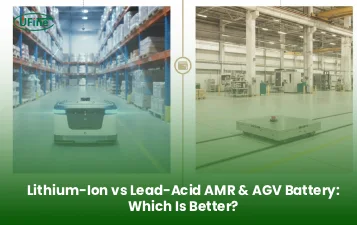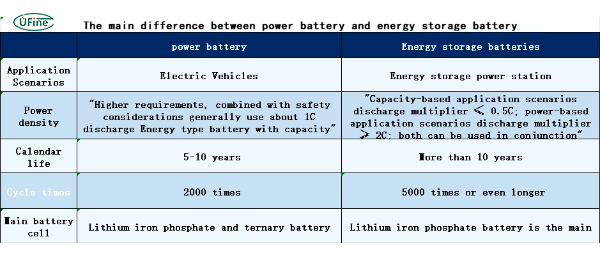
Are you curious about the disparities between power and energy batteries? Today, we’ll explore these distinctions to gain a better understanding. Join us as we break down each type’s fundamental differences and applications. Let’s dive into the world of battery technology and uncover the contrast between power and energy batteries.
Part 1. What is a power battery?
A high-power battery, commonly referred to as a power battery, is a rechargeable energy storage device designed to deliver rapid bursts of electrical energy. Unlike energy batteries, which prioritize long-term energy storage, power batteries are optimized for high power discharge when needed, especially in applications like electric vehicles, power tools, and systems requiring quick acceleration or heavy loads.
Primary functions:
- Supply rapid bursts of energy.
- Provide consistent power output for high-demand applications.
- Enable quick charging and discharging cycles.
- Support devices requiring sudden power surges, such as electric vehicles and power tools.
Types:
- Lithium-ion batteries: Widely used for their high energy density and lightweight nature, they are common in power applications such as electric vehicles, portable electronics, and energy storage systems.
- Nickel-metal hydride (NiMH) batteries: Known for their robustness and ability to handle frequent charge and discharge cycles, NiMH batteries power tools, hybrid vehicles, and specific portable electronic devices.
- Lead-acid batteries: These batteries, while not typically classified as high-power batteries, are still used in various power applications such as automotive starting, lighting, and ignition (SLI) systems, as well as in backup power systems for telecommunications and emergency lighting due to their reliability and low cost.
Characteristics:
- High power output capability.
- Fast charging and discharging rates.
- They handle frequent charge and discharge cycles.
- Lower energy density compared to energy batteries.
- Utilizes chemistries optimized for high-power performance, like lithium-ion or nickel-metal hydride.
Part 2. What is an energy battery?
An energy battery, also known as a high-energy battery, is a rechargeable battery designed to store and release energy over an extended period. These batteries are optimized to provide sustained power output, making them ideal for applications requiring long-lasting energy storage and usage.
Primary functions:
- Store energy for extended periods.
- Provide a steady and consistent power supply.
- Support devices and systems requiring continuous operation over time.
- Enable portable electronics, renewable energy systems, and backup power solutions.
Types:
- Lead-acid batteries: Known for their durability and cost-effectiveness, they power off-grid solar systems, backup power supplies, and emergency lighting.
- Lithium-ion batteries: Popular for their high energy density and long cycle life, they are used in residential and commercial energy storage systems, electric vehicles, and portable electronics.
- Flow batteries: These use liquid electrolytes stored in external tanks, allowing for easy scalability and long-duration energy storage, which is ideal for grid storage and renewable energy integration.
- Sodium-sulfur batteries: High-temperature batteries are known for their large-scale energy storage capacity, often used in grid storage and industrial applications.
- Nickel-iron batteries: Durable and capable of deep discharge, these are used in off-grid applications and renewable energy storage.
Characteristics:
- High energy density, allowing for efficient storage of large amounts of energy.
- Slow discharge rate, providing a stable and reliable power supply over time.
- Longer lifespan compared to power batteries due to optimized charge and discharge cycles.
- Utilizes chemistries such as lithium-ion or lead acid to maximize energy storage capabilities.
- Suited for applications where sustained power output is more critical than rapid bursts of energy.
Part 3. What is the difference between power and energy batteries?
| Aspect | Power Batteries | Energy Batteries |
|---|---|---|
| Purpose | High energy bursts, suitable for rapid acceleration or heavy loads | Long-term energy storage, continuous power output |
| Power Output | High, delivers rapid energy discharge | Steady, consistent energy over time |
| Charging/Discharging Rates | Fast charging/discharging | Slower charging/discharging |
| Energy Density | Lower energy density | Higher energy density |
| Lifespan | Shorter lifespan, faster degradation | Longer lifespan, efficient charge/discharge management |
| Applications | EVs, power tools, emergency systems | Portable electronics, renewable energy storage, backup power |
| Chemistry | Lithium-ion, nickel-metal hydride | Lithium-ion, lead-acid, nickel-cadmium |
Purpose:
- Power batteries deliver high bursts of energy quickly.
- They are suitable for applications requiring rapid acceleration or heavy loads.
- On the other hand, energy batteries prioritize long-term energy storage and sustained power output, making them ideal for devices needing continuous operation over extended periods.
Power Output:
- Power batteries offer high power output capability, enabling them to discharge energy rapidly when needed.
- Energy batteries provide a steady and consistent power supply over time, with a focus on maintaining a stable energy output.
Charging and Discharging Rates:
- Power batteries typically support fast charging and discharging rates, allowing for quick replenishment and energy utilization.
- Energy batteries have slower charging and discharging rates, ensuring a more gradual release and absorption of energy.
Energy Density:
- Power batteries tend to have lower energy density than energy batteries, prioritizing power output over long-term energy storage.
- Energy batteries boast high energy density, maximizing the amount of energy stored within a given volume or weight.
Lifespan:
- Power batteries may experience faster degradation over time due to frequent charge and discharge cycles, especially when subjected to high-power demands.
- Energy batteries often have a longer lifespan thanks to optimized charge and discharge management systems prioritizing energy storage efficiency.
Applications:
- Devices and systems requiring sudden power surges, such as electric vehicles, power tools, and hybrid electric systems, commonly use power batteries.
- Energy batteries find applications in portable electronics, renewable energy systems, uninterruptible power supplies (UPS), and backup power solutions where sustained energy supply is essential.
Chemistry:
- Power batteries may utilize chemistries like lithium-ion or nickel-metal hydride optimized for high-power performance.
- Energy batteries can employ various chemistries, including lithium-ion, lead-acid, or nickel-cadmium, tailored to maximize energy storage capacity and efficiency.
Part 4. Power battery vs. energy battery: Use cases and applications
Power Battery Use Cases:
- Electric Vehicles (EVs): Power batteries provide the rapid acceleration required for performance and efficiency in EVs.
- Power Tools: Cordless power tools like drills, saws, and screwdrivers rely on power batteries for their high-energy bursts.
- Emergency Systems: Power batteries are critical for backup energy in hospitals and telecommunication facilities.
- Hybrid Electric Vehicles (HEVs): Power batteries store energy from regenerative braking and provide extra power during acceleration.
- Aerospace: Power batteries are used in spacecraft and satellite systems for communication, navigation, and experiments.
- Grid Stabilization: Power batteries help stabilize the power grid during peak demands.
Energy Battery Use Cases:
- Portable Electronics: Powering devices like smartphones, laptops, and tablets for long-lasting use.
- Renewable Energy Storage: Storing excess energy from solar panels and wind turbines to enhance grid reliability.
- Backup Power Systems: Providing power during outages for homes and businesses.
- Off-Grid Power Solutions: Essential for self-sufficient systems in remote locations (e.g., cabins, RVs).
- Residential Energy Management: Energy batteries help optimize home energy usage and reduce costs.
- Marine and RV Applications: Powering boats, yachts, and RVs for a clean, quiet energy source.
Part 5. FAQs
-
What is the difference between a high-power and high-energy battery?
A high-power battery delivers energy quickly in short bursts. It is suitable for devices that need rapid acceleration or heavy loads. On the other hand, a high-energy battery focuses on storing and releasing energy over an extended period, making it ideal for devices requiring long-lasting power. -
What is the difference between battery energy and power density?
Battery energy density refers to the amount of energy a battery can store per unit volume or weight, indicating its capacity for long-term energy storage. On the other hand, power density measures how quickly a battery can deliver energy, indicating its ability to provide high bursts of power. -
What are the different types of energy batteries?
There are several types of energy batteries, including lithium-ion, lead-acid, nickel-cadmium, and nickel-metal hydride. Each type has its characteristics and serves various applications, ranging from portable electronics to renewable energy storage systems. -
What is the life of a power battery?
The lifespan of a power battery typically ranges from 3 to 10 years, depending on factors such as usage patterns, operating conditions, and maintenance. With regular use and proper care, a power battery can last 5 to 7 years on average.
Related Tags:
More Articles

Lithium-Ion vs Lead-Acid AMR & AGV Batteries Compared
Discover the pros and cons of lithium-ion and lead-acid AMR & AGV batteries. Learn about cost, lifespan, safety, and which is right for your fleet.
Robot Vacuum Battery Replacement: Easy Step-by-Step Guide
Learn how to replace a robot vacuum battery safely and easily. Step-by-step instructions, battery types, costs, and common mistakes to avoid.
Discover how to choose the right battery for your robot. Compare Li-ion, LiFePO₄, NiMH, and more for performance, safety, and cost.
Inside Humanoid Robot Battery Pack Design
A deep dive into humanoid robot battery pack design, covering battery life, voltage, capacity, safety, and real-world engineering trade-offs.
Humanoid Robot Battery Life: How Long Do They Really Last?
Most humanoid robots run 1.5–4 hours per charge. Learn real-world battery life, battery types, capacity limits, and future improvements.



